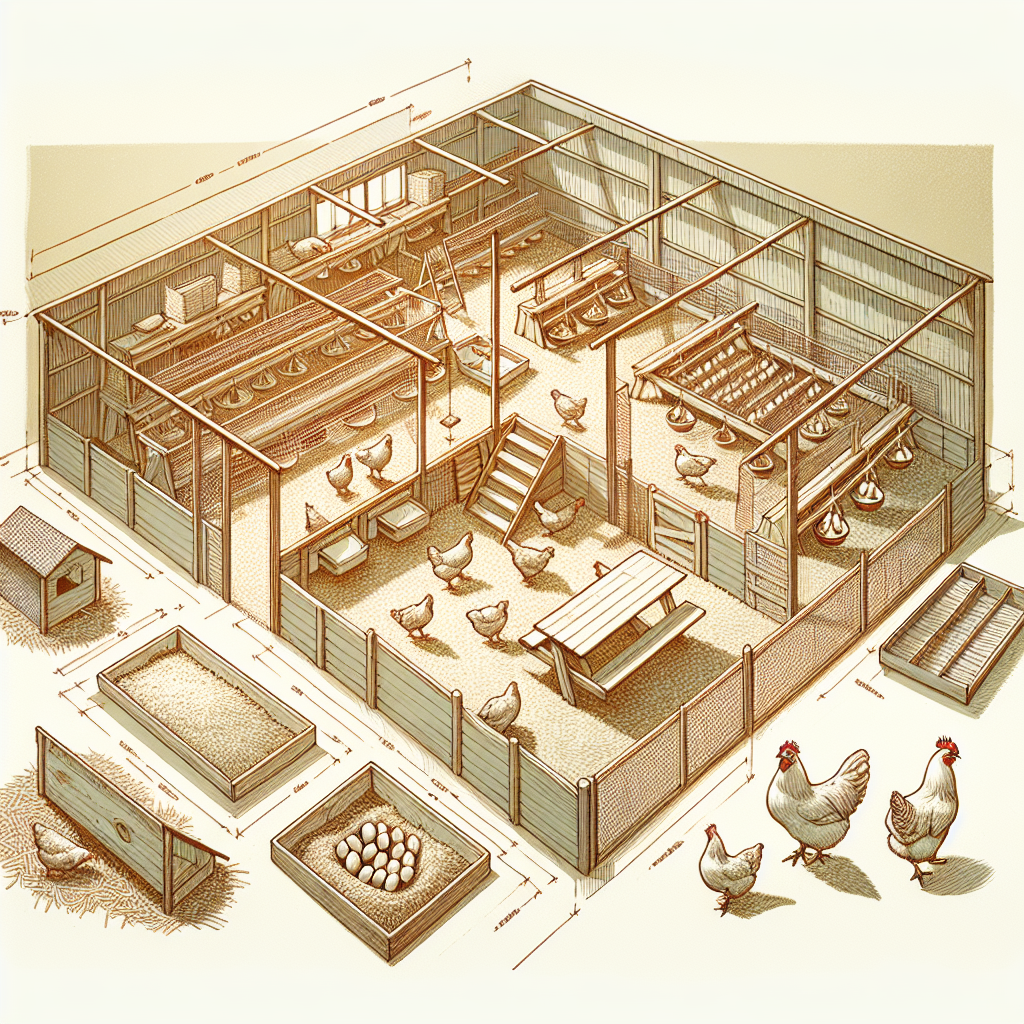If you’re a proud chicken owner or someone who simply enjoys the wholesome satisfaction of fresh eggs, you may have wondered what steps you can take to ensure clean and hygienic eggs from your flock. From maintaining a clean coop to implementing proper egg handling practices, there are several easy and practical measures you can adopt to ensure the quality and cleanliness of the eggs your chickens lay. By following these simple steps, not only will you have a healthier and happier flock, but you’ll also be able to enjoy delicious eggs with peace of mind. So, let’s explore the various measures you can take to ensure clean eggs from your chickens.
Keep the Coop Clean
Regularly Remove Waste
To ensure clean eggs from your chickens, it is essential to regularly remove waste from the coop. Accumulated waste can attract pests, promote the growth of harmful bacteria, and lead to dirty eggs. Make it a habit to remove droppings and soiled bedding daily or every other day, depending on the size of your flock. By keeping the coop clean, you create a healthier environment for your chickens and help ensure the cleanliness of their eggs.
Use High-Quality Bedding
Using high-quality bedding is another important step to maintain clean eggs. Bedding materials such as straw, wood shavings, or pine shavings provide a comfortable and clean surface for your chickens to rest on. They also absorb moisture and help keep the coop dry, avoiding the development of unsanitary conditions. Replace the bedding regularly, ensuring a fresh and clean environment for your chickens and ultimately, clean eggs.
Clean Feeders and Waterers
Clean feeders and waterers are crucial for both the health of your chickens and the cleanliness of their eggs. Regularly clean and sanitize the feeders and waterers to prevent the buildup of bacteria and mold. It is recommended to wash them with warm soapy water and thoroughly rinse them before refilling. By maintaining clean feeding and watering equipment, you minimize the risk of contamination and promote clean eggs.
Control Pests
Pests such as flies, rodents, and mites can cause havoc in the coop, leading to dirty eggs and potential health issues for your chickens. Implementing pest control measures is essential to ensure clean eggs. Keep the coop free from food spills and ensure proper storage of feed to avoid attracting pests. Additionally, consider using natural deterrents or organic pest control methods to minimize the presence of pests in and around the coop. Regular inspections and proactive pest control practices will contribute to cleaner eggs from your chickens.
Maintain Hygiene
Wash Your Hands
Maintaining personal hygiene is crucial when handling chickens and collecting eggs. Always wash your hands thoroughly with soap and water before and after handling the chickens, collecting eggs, or performing any coop maintenance tasks. This preventive measure helps avoid the transfer of bacteria or contaminants from your hands to the eggs. Proper hand hygiene ensures the cleanliness and safety of the eggs you gather.
Collect Eggs Promptly
Collecting eggs promptly is another important aspect of ensuring clean eggs. Leaving eggs in the nest boxes for extended periods can increase the chances of contamination, as chickens may inadvertently step on or peck at them. Make it a routine to check the nest boxes several times a day and collect any eggs as soon as possible. By doing so, you minimize the risk of dirt, chicken droppings, or other contaminants making their way onto the eggs.
Avoid Overcrowding
Overcrowding in the chicken coop can lead to unsanitary conditions and dirty eggs. When chickens are crowded, they can easily walk over each other’s droppings and create a messy environment. Ensuring adequate space for your flock is essential to maintain cleanliness. Provide sufficient room for each chicken to move comfortably and avoid overcrowding. This will not only improve their well-being but also contribute to cleaner eggs.
Prevent Visitors
Preventing unwanted visitors from accessing your coop is crucial to maintaining hygiene and cleanliness. Wild animals, stray cats, or even your own pets can introduce dirt, parasites, or diseases to the coop, resulting in potentially dirty eggs. Secure the coop with sturdy fencing, cover any openings or gaps, and consider installing predator-proof locks on doors and windows. Regularly inspect the coop perimeter for signs of intrusion and promptly address any potential breaches. By keeping unwanted visitors out, you can ensure cleaner and safer eggs from your flock.
Provide a Suitable Diet
Balanced Feeding
Providing a balanced diet for your chickens is not only essential for their overall health but also contributes to the quality and cleanliness of their eggs. A well-balanced diet consisting of commercial chicken feed, supplemented with fresh fruits, vegetables, and occasional treats, ensures that your chickens receive the necessary nutrients. A healthy diet promotes better eggshell quality, reducing the likelihood of cracks or contamination during laying.
Avoid Muddy or Wet Conditions
Muddy or wet conditions in the coop can lead to dirty eggs. Avoiding these conditions is crucial to maintaining cleanliness. Ensure proper drainage in the coop and prevent water from accumulating. Implement strategies such as adding gravel or sand in problem areas to provide a drier surface. By keeping the coop clean and dry, you minimize the chances of dirt or mud clinging to the eggs.
Control Access to Certain Foods
Controlling access to certain foods can help maintain clean eggs. Some foods, such as onions or strongly flavored treats, can affect the taste or smell of eggs. Avoid feeding these foods in excessive amounts, as their strong flavors can be absorbed into the eggshells. Additionally, certain foods, such as moldy or spoiled leftovers, should never be given to the chickens, as they can cause digestive issues and lead to unsanitary eggs. By controlling access to certain foods, you can ensure cleaner and more pleasant-tasting eggs.
Manage Nest Boxes
Provide Clean Bedding
Clean bedding in the nest boxes is essential to ensuring clean eggs. Replace the bedding regularly, especially if it becomes soiled or wet. Fresh bedding provides a clean and comfortable surface for the chickens to lay their eggs and reduces the chance of contamination during the laying process. Consider using materials such as straw or wood shavings, which are less likely to stick to the eggs and easier to clean. By providing clean bedding, you create a hygienic environment that promotes clean eggs.
Ensure Nest Boxes Are Elevated
Elevating the nest boxes is a simple yet effective way to keep eggs clean. When chickens have access to the nest boxes from the ground level, they can easily kick dirt, bedding, or feces into the boxes, contaminating the eggs. By elevating the nest boxes at a suitable height, you reduce the risk of debris falling into the eggs. This small adjustment can greatly improve the cleanliness of the eggs you collect.
Regularly Monitor and Clean Nest Boxes
Regular monitoring and cleaning of the nest boxes are essential to maintain cleanliness. Check the nest boxes daily for any signs of dirt, droppings, or broken eggs. Remove any contaminants using a clean cloth or sponge. If an egg is broken, it is crucial to clean the nest box thoroughly and discard any affected eggs. By consistently monitoring and cleaning the nest boxes, you ensure a clean and safe environment for your chickens to lay their eggs.
Implement Biosecurity Measures
Isolate New Birds
When introducing new birds to your flock, it is essential to isolate them for a period of time. Isolation helps prevent the spread of diseases and parasites, which can contaminate both the chickens and their eggs. Separate the new birds into a separate area or quarantine them in a different coop until they have been thoroughly examined and deemed healthy. This precautionary measure minimizes the risk of introducing any potential contaminants and helps maintain the cleanliness of your eggs.
Disinfect Equipment and Footwear
Regularly disinfecting equipment and footwear is crucial to maintaining biosecurity and preventing the transfer of contaminants. Clean and sanitize any tools or equipment used in the coop, including egg gathering baskets, feed scoops, and cleaning supplies. Additionally, disinfect your footwear before entering the coop to avoid tracking in dirt, bacteria, or parasites. By implementing these measures, you minimize the risk of introducing outside contaminants and maintain the cleanliness of your eggs.
Limit Exposure to Outside Birds
Limiting exposure to outside birds is important for maintaining biosecurity and preventing the transmission of diseases or parasites. Wild birds or birds from other flocks can introduce contaminants to your coop, resulting in dirty eggs. Restrict access to your chickens’ area and avoid feeding them outdoors, where they may come into contact with wild birds. By minimizing exposure to outside birds, you reduce the risk of contamination and help ensure clean eggs from your flock.
Monitor for Disease
Regular monitoring for signs of disease is vital to maintain biosecurity and egg cleanliness. Keep a close eye on your chickens’ behavior, appetite, and overall health. Look for any signs of illness, including changes in appearance, lethargy, abnormal droppings, or decreased egg production. If you notice any concerning symptoms, consult a veterinarian promptly. Early detection and treatment of diseases help prevent the spread of contaminants and ensure the quality and cleanliness of your eggs.
Monitor Egg Production and Quality
Regularly Inspect Eggs
Regular inspections of your eggs are necessary to ensure their cleanliness and quality. Examine each egg closely, checking for any visible dirt, cracks, or abnormalities. If any eggs appear dirty, set them aside for cleaning or consumption rather than mixing them with the clean ones. By diligently inspecting your eggs, you can identify any issues and take appropriate action to maintain clean eggs from your chickens.
Check for Signs of Contamination
In addition to inspecting for dirt or cracks, it is crucial to check for signs of contamination on the eggs. Contamination can occur from a variety of sources, including bacteria present on the eggshell or pathogens transferred from the environment. Look for any unusual odors, mold growth, or sticky residue on the eggs. If you notice any signs of contamination, it is safest to discard the affected eggs. Regularly checking for contamination helps ensure that only clean and safe eggs make it into your kitchen.
Implement Quality Control Measures
Implementing quality control measures is essential to maintain the cleanliness and quality of your eggs. Establish standards for egg appearance, cleanliness, and size. Regularly assess the eggs against these standards, discarding any that do not meet the criteria. This step ensures that only the best, cleanest, and highest-quality eggs are kept for consumption or sale. By implementing quality control measures, you enhance the reputation of your eggs and maintain the satisfaction of your customers.
Minimize Stress
Create a Comfortable Environment
Creating a comfortable environment for your chickens is essential to minimize stress and promote clean eggs. Provide adequate space, ventilation, and natural light in the coop. Maintain a consistent temperature and humidity level. Avoid overcrowding and provide opportunities for chickens to engage in natural behaviors like scratching and perching. A stress-free environment helps keep chickens healthy and reduces the likelihood of dirty or abnormal eggs.
Avoid Sudden Changes
Chickens are sensitive to sudden changes in their environment, which can lead to stress and even egg quality issues. Minimize sudden disruptions, such as switching feed brands or introducing new flock members. If changes are necessary, do so gradually, allowing your chickens to adapt over time. By avoiding sudden changes, you reduce stress levels and maintain a stable laying pattern, resulting in cleaner and more consistent eggs.
Handle Birds with Care
Handling chickens with care is crucial to minimizing stress and maintaining the cleanliness of their eggs. When picking up or moving chickens, do so gently and avoid sudden movements. Properly handle eggs, supporting them with both hands to prevent cracking or breaking. By handling birds and eggs with care, you create a calm and non-threatening environment that contributes to both the well-being of your chickens and the cleanliness of their eggs.
Properly Store Eggs
Maintain Cool Temperatures
Proper storage of eggs is essential to preserve their freshness and cleanliness. After collecting eggs, place them in a clean container and store them in a cool environment. Ideally, the temperature should be around 45 to 50 degrees Fahrenheit (7 to 10 degrees Celsius). Avoid storing eggs near strong-smelling foods or substances, as they can absorb unpleasant odors. By maintaining cool temperatures during storage, you help extend the shelf life and preserve the cleanliness of your eggs.
Avoid Washing Eggs
Contrary to popular belief, washing eggs is not recommended. Eggshells have a natural protective coating called the bloom, which helps seal the pores and prevent bacteria from entering. Washing eggs removes this protective layer, making them more susceptible to contamination. Instead of washing, gently dry-clean dirty eggs using a soft brush or cloth before storage. By avoiding washing, you maintain the natural protective barrier of the eggs and safeguard their cleanliness.
Store in Clean Containers
Using clean and sanitized containers is crucial when storing eggs. Ensure that the containers are free from dirt, bacteria, or any other potential contaminants. Plastic or glass containers with tight-fitting lids are suitable for storing eggs, preventing the absorption of odors and reducing the risk of contamination. Regularly clean and sanitize the containers to maintain proper hygiene. By using clean containers, you preserve the cleanliness of the eggs during storage.
Conclusion
Ensuring clean eggs from your chickens requires a proactive approach to coop cleanliness, personal hygiene, and maintaining a suitable environment for your flock. By regularly removing waste, using high-quality bedding, cleaning feeders and waterers, and controlling pest infestations, you create a clean and healthy coop environment. Practicing good personal hygiene, promptly collecting eggs, avoiding overcrowding, and preventing unwanted visitors further contribute to the cleanliness of the eggs. Providing a balanced diet, preventing muddy or wet conditions, and controlling access to certain foods promote clean and pleasant-tasting eggs. Managing nest boxes, implementing biosecurity measures, monitoring egg production and quality, minimizing stress, properly storing eggs, and following quality control measures are additional steps to ensure clean and safe eggs. By implementing these comprehensive steps, you can enjoy the satisfaction of consistently collecting clean and fresh eggs from your chickens.




